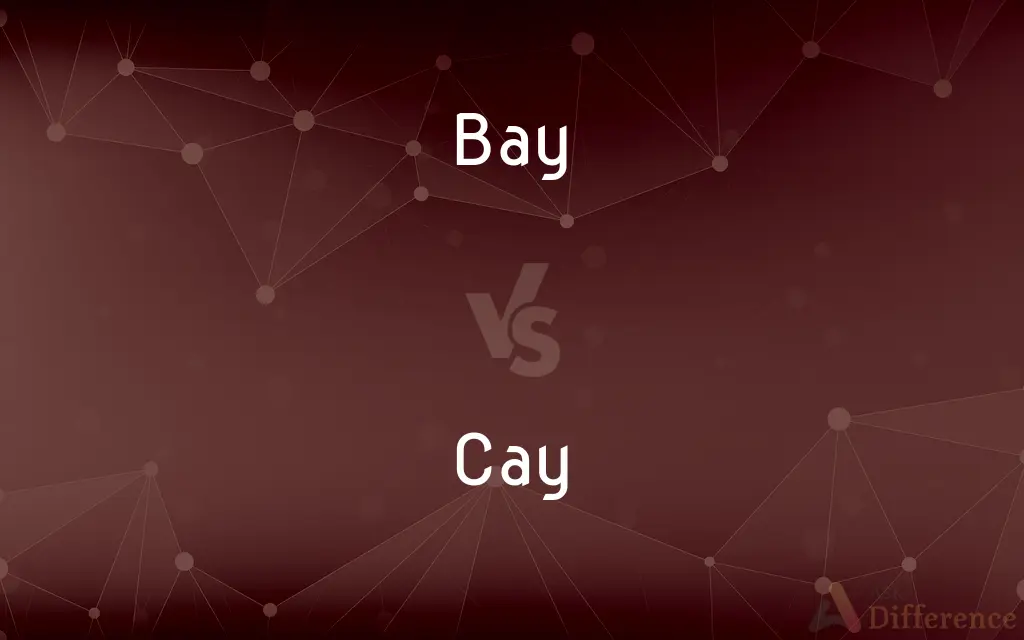Bay vs. Cay — What's the Difference?
By Tayyaba Rehman — Updated on January 14, 2024
A bay is a body of water partially surrounded by land, typically on three sides. A cay (also spelled "key") is a small, low-elevation, sandy island formed on the surface of a coral reef.

Difference Between Bay and Cay
Table of Contents
ADVERTISEMENT
Key Differences
Bays are coastal water bodies that indent into the land. They are often larger than coves and can provide safe harbors for ships. Cays are small, sandy islands located on the surface of coral reefs, typically found in tropical regions.
Bays form through various geological processes, including erosion and changes in sea level, creating a recessed coastline. Cays form from the accumulation of sand and sediment on top of coral reef platforms, often as a result of ocean currents and wave action.
The size of bays can vary greatly, from small inlets to extensive bodies of water like Hudson Bay. Cays are usually quite small and low-lying, making them susceptible to changes in sea level and storm impacts.
Bays can be found in a variety of climates and geographical locations around the world. Cays are typically found in warm, tropical ocean regions, like the Caribbean.
In terms of ecosystem, bays often have a rich diversity of marine life and serve as important areas for fish breeding and bird life. Cays support unique ecosystems, often hosting seabird colonies and serving as important nesting sites for sea turtles.
ADVERTISEMENT
Comparison Chart
Definition
A body of water partially surrounded by land
A small, sandy island on a coral reef
Formation
Geological processes such as erosion
Accumulation of sand on coral reefs
Size and Elevation
Variable sizes, usually larger
Small and low-lying
Location
Worldwide, in various climates
Primarily in tropical regions
Ecological Significance
Diverse marine ecosystems, fish breeding areas
Seabird habitats, nesting sites for sea turtles
Compare with Definitions
Bay
A bay is a recessed coastal body of water.
The city's harbor is located in a natural bay.
Cay
They are formed by the accumulation of coral sand and debris.
The cay has grown over time from the accumulation of coral sand.
Bay
They often have diverse marine ecosystems.
The bay is a popular spot for marine biology research due to its rich biodiversity.
Cay
Cays are low-lying and susceptible to sea-level changes.
Rising sea levels pose a threat to the existence of the cay.
Bay
Bays provide protection from harsh sea conditions.
Fishermen often anchor their boats in the bay for shelter from storms.
Cay
A cay is a small, sandy island formed on a coral reef.
We visited a tiny cay during our snorkeling trip.
Bay
A bay is a recessed, coastal body of water that directly connects to a larger main body of water, such as an ocean, a lake, or even another bay. A large bay is usually called a gulf, sea, sound, or bight.
Cay
Cays are usually found in tropical ocean regions.
The Bahamas are known for their beautiful cays.
Bay
A body of water partially enclosed by land but with a wide mouth, affording access to the sea
The Bay of Biscay.
Cay
Cays often support unique wildlife, such as seabirds.
The cay is a nesting ground for several species of seabirds.
Bay
An area of land, such as an arm of prairie partially enclosed by woodland, that resembles in shape or formation a partially enclosed body of water.
Cay
A cay ( or ), also spelled caye or key, is a small, low-elevation, sandy island on the surface of a coral reef. Cays occur in tropical environments throughout the Pacific, Atlantic and Indian Oceans (including in the Caribbean and on the Great Barrier Reef and Belize Barrier Reef).
Bay
(Architecture) A part of a building marked off by vertical elements, such as columns or pilasters
An arcade divided into ten bays.
Cay
A small, low island composed largely of coral or sand.
Bay
A bay window.
Cay
A small, low island largely made of sand or coral.
Bay
An opening or recess in a wall.
Cay
See Key, a ledge.
Bay
A section or compartment, as in a service station, barn, or aircraft, that is set off for a specific purpose
A cargo bay.
An engine bay.
Cay
A coral reef off the southern coast of Florida
Bay
A sickbay.
Bay
(Computers) A drive bay.
Bay
A reddish brown.
Bay
A reddish-brown animal, especially a horse having a black mane and tail.
Bay
A deep, prolonged bark, such as the sound made by hounds.
Bay
The position of one cornered by pursuers and forced to turn and fight at close quarters
The hunters brought their quarry to bay.
Bay
The position of having been checked or held at a distance
"He has seen the nuclear threat held at bay for 40 years" (Earl W. Foell).
Bay
See laurel.
Bay
Any of certain other trees or shrubs with aromatic foliage, such as the California laurel.
Bay
A crown or wreath made especially of the leaves and branches of the laurel and given as a sign of honor or victory.
Bay
Often bays Honor; renown.
Bay
Reddish-brown
A bay colt.
Bay
To utter a deep, prolonged bark.
Bay
To pursue or challenge with barking
"I had rather be a dog, and bay the moon" (Shakespeare).
Bay
To express by barking or howling
A mob baying its fury.
Bay
To bring to bay
"too big for the dogs which tried to bay it" (William Faulkner).
Bay
(obsolete) A berry.
Bay
, a tree or shrub of the family Lauraceae, having dark green leaves and berries.
Bay
Bay leaf, the leaf of this or certain other species of tree or shrub, used as a herb.
Bay
The leaves of this shrub, woven into a garland used to reward a champion or victor; hence, fame, victory.
Bay
A tract covered with bay trees.
Bay
A kind of mahogany obtained from Campeche in Mexico.
Bay
(geography) A body of water (especially the sea) more-or-less three-quarters surrounded by land.
Bay
A bank or dam to keep back water.
Bay
An opening in a wall, especially between two columns.
Bay
An internal recess; a compartment or area surrounded on three sides.
Bay
The distance between two supports in a vault or building with a pitched roof.
Bay
(nautical) Each of the spaces, port and starboard, between decks, forward of the bitts, in sailing warships.
Bay
(rail transport) A bay platform.
Bay
A bay window.
Bay
The excited howling of dogs when hunting or being attacked.
Bay
(by extension) The climactic confrontation between hunting-dogs and their prey.
Bay
(figuratively) A state of being obliged to face an antagonist or a difficulty, when escape has become impossible.
Bay
A brown colour/color of the coat of some horses.
Bay
A horse of this color.
Bay
(intransitive) To howl.
Bay
(transitive) To bark at; hence, to follow with barking; to bring or drive to bay.
To bay the bear
Bay
(transitive) To pursue noisily, like a pack of hounds.
Bay
Of a reddish-brown colour (especially of horses).
Bay
Reddish brown; of the color of a chestnut; - applied to the color of horses.
Bay
An inlet of the sea, usually smaller than a gulf, but of the same general character.
Bay
A small body of water set off from the main body; as a compartment containing water for a wheel; the portion of a canal just outside of the gates of a lock, etc.
Bay
A recess or indentation shaped like a bay.
Bay
A principal compartment of the walls, roof, or other part of a building, or of the whole building, as marked off by the buttresses, vaulting, mullions of a window, etc.; one of the main divisions of any structure, as the part of a bridge between two piers.
Bay
A compartment in a barn, for depositing hay, or grain in the stalks.
Bay
A kind of mahogany obtained from Campeachy Bay.
Bay
A berry, particularly of the laurel.
Bay
The laurel tree (Laurus nobilis). Hence, in the plural, an honorary garland or crown bestowed as a prize for victory or excellence, anciently made or consisting of branches of the laurel.
The patriot's honors and the poet's bays.
Bay
A tract covered with bay trees.
Bay
Deep-toned, prolonged barking.
Bay
A state of being obliged to face an antagonist or a difficulty, when escape has become impossible.
Embolden'd by despair, he stood at bay.
The most terrible evils are just kept at bay by incessant efforts.
Bay
A bank or dam to keep back water.
Bay
To bark, as a dog with a deep voice does, at his game.
The hounds at nearer distance hoarsely bayed.
Bay
To bark at; hence, to follow with barking; to bring or drive to bay; as, to bay the bear.
Bay
To bathe.
Bay
To dam, as water; - with up or back.
Bay
An indentation of a shoreline larger than a cove but smaller than a gulf
Bay
The sound of a hound on the scent
Bay
Small Mediterranean evergreen tree with small blackish berries and glossy aromatic leaves used for flavoring in cooking; also used by ancient Greeks to crown victors
Bay
A compartment on a ship between decks; often used as a hospital;
They put him in the sick bay
Bay
A compartment in an aircraft used for some specific purpose;
He opened the bomb bay
Bay
A small recess opening off a larger room
Bay
A horse of a moderate reddish-brown color
Bay
Utter in deep prolonged tones
Bay
Bark with prolonged noises, of dogs
Bay
(used of animals especially a horse) of a moderate reddish-brown color
Bay
Bays can be large and serve as important ports or harbors.
San Francisco Bay is known for its size and significance as a commercial harbor.
Bay
Bays can be formed by erosion of the coastline.
Over centuries, the bay was formed by the erosion of the surrounding cliffs.
Common Curiosities
What defines a bay?
A bay is defined by its indentation into the land and being partially surrounded by land.
Can bays be found in freshwater environments?
Yes, bays can be found in both freshwater and marine environments.
What recreational activities are common in bays?
Activities like boating, fishing, swimming, and watersports are common in bays.
Do bays typically have diverse ecosystems?
Yes, bays often have rich marine ecosystems due to their sheltered waters.
Can bays be artificially created?
Yes, bays can be artificially created or enhanced through coastal engineering.
Do cays face environmental threats?
Cays face threats like climate change, sea-level rise, and human impact, which can affect their stability and ecosystems.
Are bays important for commercial purposes?
Yes, many bays are crucial for commercial activities like shipping, fishing, and tourism.
How do bays differ from gulfs?
Bays are generally smaller and less deeply indented than gulfs.
Are all cays inhabitable?
Not all cays are inhabitable; many are too small or unstable for permanent structures.
Are cays typically formed in shallow waters?
Yes, cays are usually formed in the shallow waters of coral reefs.
How are cays formed?
Cays are formed by the accumulation of sand and debris on coral reef platforms.
What makes cays important ecologically?
Cays are important for wildlife such as seabirds and sea turtles, serving as nesting and breeding sites.
How do bays influence local climates?
Bays can moderate local climates, often creating milder conditions compared to inland areas.
What challenges do cays face due to tourism?
Tourism can bring challenges like pollution, habitat destruction, and overuse of resources, impacting cays' fragile environments.
Can cays support vegetation?
Some cays can support vegetation, particularly those that have built up enough soil and stability.
Share Your Discovery

Previous Comparison
Behavioural vs. Behavioral
Next Comparison
Plethoric vs. RuddyAuthor Spotlight
Written by
Tayyaba RehmanTayyaba Rehman is a distinguished writer, currently serving as a primary contributor to askdifference.com. As a researcher in semantics and etymology, Tayyaba's passion for the complexity of languages and their distinctions has found a perfect home on the platform. Tayyaba delves into the intricacies of language, distinguishing between commonly confused words and phrases, thereby providing clarity for readers worldwide.
















































